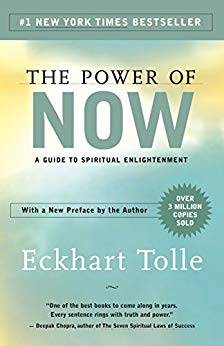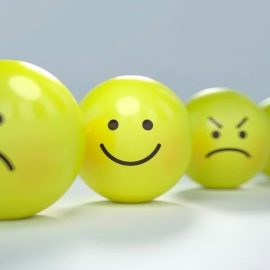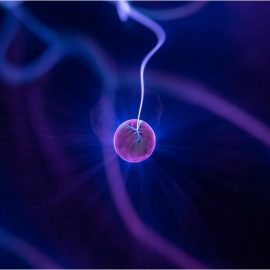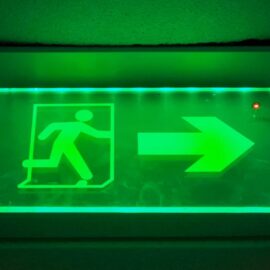

This article is an excerpt from the Shortform summary of "The Power of Now" by Eckhart Tolle. Shortform has the world's best summaries of books you should be reading.
Like this article? Sign up for a free trial here .
Eckhart Tolle has a lot of teachings, and he spends most of his teachings on the ego and the problems it can cause. What is the ego, and why is it the source of many bad emotions and problems in your life?
According to Tolle, your ego is the voice inside your head. It can be characterized as the devil or angel on your shoulder. It is the voice that analyzes what’s going on around you, comments on your interactions, dwells on the past, speculates about the future, complains, likes or dislikes things, and makes you question yourself in moments of doubt. This internal voice is the ego.
What Is the Ego?
According to Eckhart Tolle, the ego is a part of your mind that tries to control your thinking and behavior. (Shortform note: This book personifies the ego as a thinking, feeling entity.)
The ego gives you an interpretation of the world, not a true reflection. The only true way to see the world is by being fully present and experiencing the Now, without judging or analyzing it.
(Shortform suggestion: Think of your mind as the screen in a movie theater — it can have rips, wrinkles, and other flaws that distort the movie being projected. Each one of us is watching the movie of life play on our own screens, which all have wear-and-tear from our past experiences, cultural conditioning, and other influences from our ego-created identity.)
According to Eckhart Tolle’s teachings, your ego is your “I” or self, how you distinguish yourself from others. The ego creates your identity from your social status; job; possessions; education; appearance; relationships; personal and family history; beliefs; and membership in political, national, racial, and religious groups.
We tend to think that these thoughts and experiences define us, and that our ego is who we are — after all, it’s coming from inside our own head, so who else could it be? But, in fact, the ego is not our true Being. Our true Being is the essence of who we are, separate from our mind and body. We’ll discuss this more later.
In order to connect with your true self, you must stop identifying with your ego. You may resist letting go of this identity because if you are not made up by the contents of your mind, then who are you? But problems arise when you identify with your ego, believing that your thoughts, memories, beliefs, and mental condition define you.
While cultural conditioning, past experiences, and other influences can, indeed, affect your behavior, there’s no need to cling to them as your identity. Allow yourself to be present and their influence may or may not come out naturally.
The Ego Manufactures Problems
According to Eckhart Tolle’s teachings, the ego only has as much power as you give it, and it gains power when you identify with it. Your ego is threatened by your true Being because when you connect with your true Being, you realize that, by contrast, you are not your ego. (We will explain what, exactly, your True Being is in the next section.)
You can feel your true Being when you are present in the Now, so the ego is also threatened by presence. In the interest of self-preservation, your ego will do whatever it can to prevent you from being present and identifying with your true self.
- The ego is the force pushing your attention away from the present to dwell on the past and future.
- The mind can only function in the past and future, because they only exist in your mind (in memories and projections). But the ego has no control over the present, so it pulls you away from the Now.
The ego uses fear as a tool to prevent you from being present.
The ego creates worry about the past and future that cause you to dwell on problems and situations you often have no control over.
The ego is not responsible for productive forms of fear that comes in response to a present and immediate danger, which activates your fight or flight response for survival. The ego only creates hypothetical and speculative fear.
(Shortform example: when you’re stuck in traffic and running late to a meeting, the ego is responsible for your stress about walking in late, your worry that your coworkers will think you’re irresponsible, and the hypothetical scene playing in your head of the boss reprimanding you. In reality, your boss and coworkers may (or may not) be more understanding than you think, and some of them might even be caught in this traffic snarl too.
Regardless, stressing about it won’t make the cars move any faster. If you’re present instead, you’ll at least be calm and alert when you do arrive for the meeting, instead of frantic and distracted. Plus, with a clear head, you might even be able to think of another route to circumvent the traffic.)
The ego creates more abstract fears, triggered by perceived threats to your ego-created identity.
If a situation or person is challenging some aspect of your supposed identity — e.g. your religious beliefs — and you relent, will you no longer be you? No, you will continue to be yourself, and you may realize that this element or belief didn’t make you who you are. That epiphany is one step closer to understanding that your ego-created identity is a sham and to connecting with your true Being. This, again, is a threat to the ego.
For example, if you always need to be right in an argument, that stems from a fear of losing your sense of identity. If you believe your thoughts and your mental positions are part of who you are (based on your ego-created identity), then being wrong shakes the foundation of your identity. But if you know your true self is not tethered to your thoughts and beliefs, then it doesn’t matter if you’re right or wrong.
Notice when you get defensive about something. Ask yourself, “What am I defending?” You are likely defending the identity your ego has created.
The ego will feel threatened as you start practicing mindfulness and resisting its control, so it may create more fears in an effort to stay in control.
How To Disconnect From Your Ego And See Your True Being
How do you disconnect from the voice inside your own head? It takes deliberate effort, attention, and practice.
According to Eckhart Tolle’s teachings, you can begin to separate your true self from your egoic mind by observing your thoughts. This is called “watching the thinker.” Thoughts come from your ego, making your ego the “thinker.” The part of you that can observe your thoughts without engaging in them is the “watcher,” your true self.
Try this: think, “I wonder what my next thought will be.” Wait and watch. Notice that your thoughts will likely stall for a moment while you are in this state of presence and alertness. You’ve just watched the thinker.
When you can understand that the watcher and the thinker are separate, then you can realize that you are not made of your thoughts. In moments when your mind is still and thoughts are quiet, you still exist and are still yourself.
As soon as you witness your thoughts, you’ve separated yourself from them — even if only for a moment. This is a victory in itself.
According to Eckhart Tolle’s teachings, we are so accustomed to the ego’s control — and the low, constant hum of thoughts running through our mind — that it can be easy to overlook. To notice if you are present, ask yourself, “Am I feeling joy, ease, and lightness?” If the answer is no, then you are not present.
If that’s the case, you may not need to change what you are doing in that moment, but how you are doing it. Focus your complete attention on each minute detail of the task at hand to bring yourself back to the present.
———End of Preview———

Like what you just read? Read the rest of the world's best summary of "The Power of Now" at Shortform . Learn the book's critical concepts in 20 minutes or less .
Here's what you'll find in our full The Power of Now summary :
- Why you feel pain from the past, and how to get rid of it
- How to be more present and stop worrying about the future
- The 8 key ways to achieve mindfulness







So, Tolle wants us to destroy our EGOs, and shames us about our “pain bodies”. Seems he knows little about psychology really. Bad ego, bad ego. Bad pain body. It is just breeding a new generation of narcissists. There is the Id, Ego, and SuperEgo. How could he not know this?
The zealots, I have met, who have given me Eckhart’s books and the tapes, are ungrounded and developmentally damaged people… unconsciously beating up others with their wounds/shadows, while skipping along practicing what they call their enlightenment. Its very unfortunate. Over time one particular friend has returned to intensive therapy to work on the power of THEN, the past that dramatically was controlling her now abusive character.
If these philosophies could be suggested as an adjunct to life, rather than THE ONE & ONLY TRUTH YOU NEED… they could serve. And we could see these teachers as very ordinary human beings, and in this guys case, just a disseminator of already known information, rather than inflate them to a stature they do not deserve…. as well as money that could be serving desperate needs in other places. (One of his many dark shadows.)
Life is much more complex than one simple answer. And each one’s ‘meaning’ is uniquely their own.
I didn’t view it this way. I just became aware of my ego and less controlled by .it I could just recognise my ego really didn’t like that hit. It stopped all the over thinking about the past and future, just looking at them when necessary. The teaching of either accept it, or do something about it makes sense. I didn’t idolize him,it is not a cult nor a religion.. I became less argumentative. I could also recognise that we all deal with the same emotions and ego. For this reason I felt more connected and less judgemental of others.
First response clearly has not understood Eckhart, he does not recommend destruction of the ego but awareness , he never uses the word bad pain , nor does he state one hat fits all , I have become calm peaceful with a better understanding of my true self.